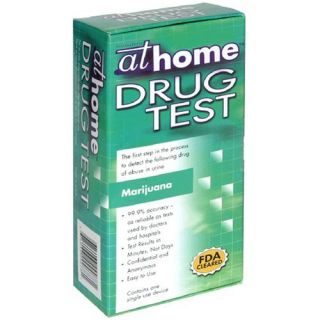Addiction
Should You Drug-Test Your Kid?
Don't do it: Drug testing at home can provide false security.
Posted October 2, 2013

If it weren’t for drug tests, your odds of seeing the words “fake penis” in a news headline would be much lower.
But we do live in a world in which drug tests are becoming more common. And, since these tests sometimes require a chaperone to watch the subject produce a urine sample, the marketplace now offers a solution that allows people (well, men anyway) to produce a clean sample via a fairly realistic delivery device.
Should parents and school officials support drug tests for young people? Many experts think so. Using mind-altering drugs puts kids and teens at all kinds of risks, including:
- psychiatric problems now and later in life
- higher odds of accidents—such as car crashes—and death
- increased chances of committing violence and antisocial behavior.
Because of these very real risks, we should take all reasonable steps to try to make sure that young people have as little exposure to these substances as possible. Several years ago, the White House Office of National Drug Control Policy supported drug testing in schools, stating that “Testing can … be an effective way to prevent drug use. The expectation that they may be randomly tested is enough to make some students stop using drugs—or never start in the first place.”
Drug testing kits are widely available from local pharmacies or the Internet, and many parents of my young patients have told me they use them. Some have just cause for testing … and others test just because.
Although I see some benefit from home drug testing, on the whole drug-testing kids in the home or at school is a waste of time, money, and emotional energy. It can also actually cause harm.
The “some benefit” I refer to occurs when the home drug test is positive. Assuming it’s not a false positive, which is always possible, this result provides clear evidence that the youth is using drugs —and the parents and others in charge should take steps to decrease that drug use. But apart from this neat and tidy scenario, drug tests are often negative.
A negative result can be falsely reassuring and, thus, dangerous. After all, suppose a teen is using drugs regularly, but just happens to be clean when he provides a urine sample. He can then point to the negative test result as “proof” of his abstinence. He may then feel emboldened to continue using, at the very time when the family or school is feeling reassured and is less likely to be suspicious.
Also, even if kids are actively, continuously using drugs, they have numerous ways to beat a drug test.
First, if a test is not checking for pH and creatinine levels, it’s easy enough to fool it with water instead of urine. This will test negative for substances of abuse. Taking things up a step, many websites sell clean urine at low cost, and teens can easily substitute the stuff for their own unless someone actually observes them urinating into a cup (and the chaperone is good at spotting a fake penis).
Furthermore, some drugs of abuse are generally not included in drug tests (whether administered in school or at home), including dextromethorphan, Salvia divinorum, and the various forms of synthetic marijuana. These drugs can be as dangerous—if not more so—than the drugs routinely found on the screening list. (See my previous post about synthetic marijuana, which is also known as K2 and Spice, among other names.) Also, youths who knows they are going to be tested might go to such dangerous extremes to use drugs that they place at further risk. One of my patients smoked so much K2 while being drug tested that she seized and nearly died.
Finally, launching a drug-testing program in your home may create an atmosphere that works against your efforts to protect your child. As the American Academy of Pediatrics notes: “Drug testing poses substantial risks—in particular, the risk of harming the parent-child and school-child relationships by creating an environment of resentment, distrust, and suspicion.”
For that matter, the AAP also points out that “there is little evidence of the effectiveness of school-based drug testing in the scientific literature.”
In some cases, drug-testing kids and teens at home—or school—has potential value. If your child has a substance abuse problem or you suspect one, discuss testing with your child’s doctor or addiction specialist.
But avoid drug-testing your kid just because you’re suspicious. You could end up losing trust in your home, and gaining a battle of wits over who can discover or hide drug use better. You may have age and wisdom…but kids have the Internet.
Sources
1. Office of National Drug Control Policy. What You Need to Know About Drug Testing in Schools. Washington DC: U.S. Government Printing Office; 2002.
2. Knight JR, Mears CJ, Committee on Substance Abuse, Council on School Health, American Academy of Pediatrics. Testing for drugs of abuse in children and adolescents: addendum--testing in schools and at home. Pediatrics. Mar 2007;119(3):627-630.




